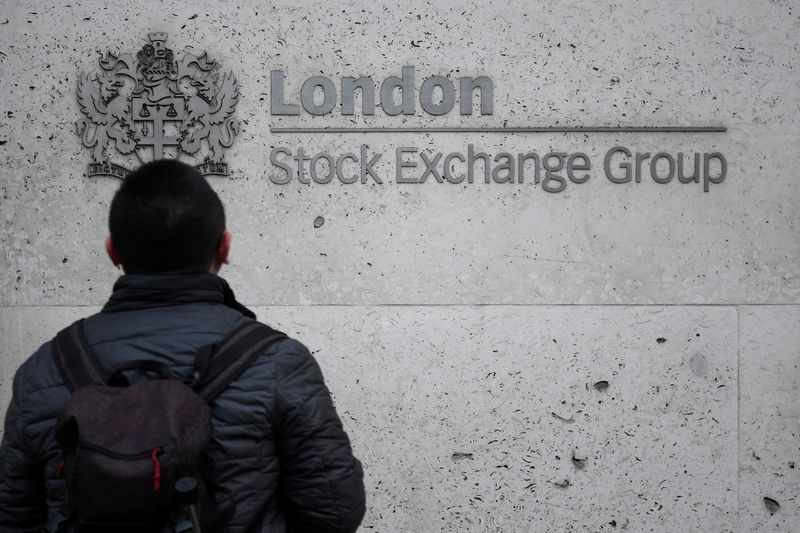By Tom Wilson
LONDON (Reuters) - Stocks across the world tumbled on Thursday as the death toll from a virus spreading in China reached 170, forcing airlines to cut flights and stores to close as the potential economic hit from the outbreak came into focus.
MSCI world equity index (MIWD00000PUS), which tracks shares in 49 countries, fell 0.5% as European shares followed Asian indexes into the red, stoking demand for the perceived security of safe-haven assets from bonds to gold.
Europe's broad STOXX 600 (STOXX) fell 0.9% in early trade, with indexes in Frankfurt (GDAXI), Paris (FCHI) and London (FTSE) lost between 0.7%-1.3%.
Adding to the gloom, disappointing earnings and trading updates weighed further on blue-chip stocks. Royal Dutch Shell (L:RDSa) fell 4.8% after fourth-quarter profit halved to its lowest in more than three years.
U.S. stock futures (ESc1) pointed to a negative open on Wall Street.
The number of confirmed deaths from the virus in China has climbed to 170 with 7,711 people infected, and more cases are being reported around the world.
Chinese factories have extended holidays, global airlines cut flights and Sweden's Ikea said it would shut all stores in China.
One Chinese government economist said the crisis could cut first quarter growth in the world's No.2 economy by one point to 5% or lower, with the crisis hitting sectors from mining to luxury goods.
Investment banks also started to put figures on what the damage could be. Citi has said it expects China's 2020 growth to slow to 5.5%, after previously predicting it to be 5.8%, with the sharpest slowdown this quarter.
Still, others cautioned that estimates were hard to make.
"The economic impact will be determined by the extent to which it spreads," said Michael Bell, global market strategist at J.P. Morgan Asset Management, adding that hard evidence of a hit to economic data was needed before the impact of the virus could be judged.
Benchmark U.S. and German government bond yields fell sharply, with 10-year German bund yields dropping to a three-month low.
U.S. 10-year Treasuries also fell 3 basis points to 1.5600%, their lowest since October (US10YT=RR). The yield curve - as measured by the gap between 10-year and three-month note and a closely watched indicator of looming recession - fell again into negative territory.
Gold edged 0.3% higher
WHO DECISION
The World Health Organisation's Emergency Committee was due to reconvene later in the day to decide whether the rapid spread of the virus now constitutes a global emergency.
"There is some concern about tonight's presser by the WHO. The fear is that they might raise the alarm bells ... so people are taking money off the table," said Chris Weston, head of research at Melbourne brokerage Pepperstone.
Earlier, MSCI's broadest index of Asia-Pacific shares outside Japan (MIAPJ0000PUS) fell 2.1% to a seven-week low and has now dropped for six straight sessions. Indexes in Japan (N225) and Hong Kong (HSI) fell 1.7% and 2.6% respectively.
Taiwan's benchmark index (TWII) slumped 5.7% in its first session since the Lunar New Year break.
Federal Reserve Chairman Jerome Powell acknowledged on Wednesday the risks from any slowdown in the Chinese economy but said it was too early to judge the impact on the United States.
The Fed held interest rates steady on Wednesday at its first policy meeting of the year, with Powell pointing to continued moderate economic growth and a "strong" job market.
In Europe, the pound
Financial markets are pricing in a 45% chance that the BOE would cut rates to 0.5% from 0.75%. Economists polled by Reuters two weeks ago predicted a 6-3 vote to keep rates on hold.
Elsewhere in currencies, a risk-averse mood ruled, with exposed Asian currencies and commodities sensitive to Chinese demand extending losses as economists made deep cuts to their China growth forecasts.
The Chinese yuan
The Australian dollar
The Japanese yen
The dollar against a basket of six major currencies (DXY) was flat.

Oil prices, a barometer of the expected impact of the virus on the world's economy, resumed their slide. Brent (LCOc1) was down 95 cents, or 1.8%, at $58.71 a barrel shortly after 0800 GMT. and has dropped 10% since Jan 20.